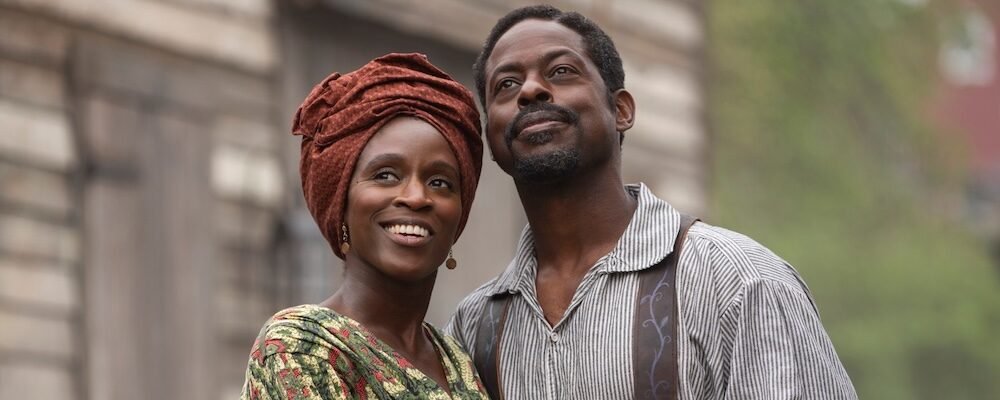‘Washington Black’: History and Fantasy Make for Exciting Adventure in Rich Adaptation of Acclaimed Novel
Alci Rengifo
History may be a bleak affair, yet there is always room for breezy adventure and humor. “Washington Black” covers some pretty heavy subject matter, including slavery, the colonial roots of America, along with inventors who just need a break. Creators Selwyn Seyfu Hind and Kimberly Ann Harrison are adapting a novel by Esi Edugyan shortlisted for the Booker prize, so the source material is already quite rich. This limited series could have gone various routes but settled on the right one. It is intense but adventurous, like a great storybook journey where we root for the main character through various trials featuring colorful side characters. The villains need little invention considering they tend to be bred out of a racist social order that is threatening enough.
The main character, George Washington Black (Ernest Kingsley Jr.) is first introduced as a sharp 19-year-old living in 1837 Halifax, Nova Scotia. This is one of the destinations of the Underground Railroad, so Wash, as he is called, though he also goes by the name Jack Crawford, is a free young Black man. He works the docks but his real passion is coming up with new inventions, to the eye-rolling of Medwin (Sterling K. Brown), his landlord. The narrative then goes back to Wash’s origins as an 11-year-old slave (Eddie Karanja) on a Barbados sugar plantation. Titch (Tom Ellis), an abolitionist scientist who is also the brother of Wash’s cruel master, Erasmus Wilde (Julian Rhind-Tutt), is intrigued by the bright boy. Together, the two make a “cloud cutter,” basically a kind of blimp. With this device the two escape and begin a grand adventure.
“Washington Black” then becomes one of those visually immersive, emotionally stirring adventures in the tradition of “Life of Pi.” Two narratives run parallel, one of Wash older in Nova Scotia and the other his odyssey as a young boy escaping slavery. Both are wonderfully connected through themes and emotional resonance. There is a love story driving the 1837 sections that strives for powerful allegories. At the docks Wash locks eyes with Tanna (Iola Evans), who he mistakes for a servant. Tanna is half Black, and her white father, Mr. Goff (Rupert Graves), has made sure to erase all traces of her mother. Though of the British upper class, Tanna still has family in the Solomon Islands, a part of her history she hopes to connect with. It’s all a strong way of also exploring all of the mixture of identities and backgrounds within the world of the 19th century Caribbean.
Tanna’s struggle for freedom to know her roots and escape from the life Mr. Goff wants to impose on her, is juxtaposed with the younger Wash’s journey. His 11-year-old self begins an odyssey that kicks off with swashbuckler fun. “Washington Black” is part of that genre known as steampunk, where sci-fi elements combine with 19th century fashion. In the world of this series there are steam-fueled air vehicles long before flight was possible. Inventions Wash concocts or sees from Titch are nearly otherworldly. Never does the design of the series ruin its believability because the performances and character arcs remain the essential components. The first stop in the high seas for young Wash and Titch finds them on the deck of a pirate ship amid wind and rain where they meet Barrington (Miles Yikenni) and Theodora (Sundra Oakley). They also meet Captain Alvarez (the late Kamar de Los Reyes), the kind of rugged adventurer with a hidden, vulnerable soul. Later there will be even more high adventure,
Other side characters are given vivid life through the writing and acting. A standout is Shaunette Renée Wilson as Big Kit, who watches over Wash in the Barbados plantation with maternal care. Tom Ellis’ Titch is penned and performed with unique complexity. He may preach abolition, yet uses Wash when it suits his ends. It is one thing to preach an ideal and quite another to actually live it. Jamie Hector in this timeline of the story has an all too brief appearance as Nat Turner, who would later lead a violent slave rebellion. He symbolizes the more militant option for Wash that is also riskier to contemplate. Sterling K. Brown is the calmer sage in Wash’s life as a free man. Not everyone is as they seem, such as William McGee (Edward Bluemel), the owner of the docks where Wash works, who is later revealed to be living quite the double identity. Julian Rhind-Tutt as Erasmus embodies the cold stupidity of evil. Like many great stories about epic journeys, the real saga unfolding is Wash’s growth as an individual, learning lessons along the way of freedom, falling in love and friendship. This is a thrilling adventure that spans continents, because growing up can feel just as difficult.
“Washington Black” begins streaming July 23 on Hulu.

